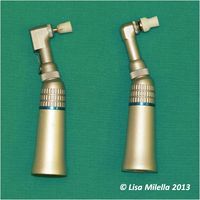Difference between revisions of "Dental Polishing Equipment"
Michuang0720 (talk | contribs) |
|||
| (5 intermediate revisions by 2 users not shown) | |||
| Line 1: | Line 1: | ||
| − | + | <br><br> | |
[[File:Dental polisher.jpg|right|200px|thumb|Dental polishers<small>''© Lisa Milella 2013''</small>]] | [[File:Dental polisher.jpg|right|200px|thumb|Dental polishers<small>''© Lisa Milella 2013''</small>]] | ||
Polishing removes plaque and stain. A '''prophy cup''' is used in a slow-speed hand-piece together with '''prophy paste'''.<br><br> | Polishing removes plaque and stain. A '''prophy cup''' is used in a slow-speed hand-piece together with '''prophy paste'''.<br><br> | ||
| − | To minimise the amount of heat generated, the prophy cup should not rotate faster than 1000 rpm (revolutions per minute). Plenty of prophy paste should be used to reduce friction, and a gentle pressure | + | To minimise the amount of heat generated, the prophy cup should not rotate faster than 1000 rpm (revolutions per minute). Plenty of prophy paste should be used to reduce friction, and a gentle pressure applied. A soft cup that can gently flare with light pressure should be used. This allows subgingival polishing. A new cup should be used for each patient to avoid cross contamination. The prophy paste should be individually dispensed from a large pot, or individual pots used to avoid contamination. A fine paste should be used to avoid superficial scratches on the surface of the [[:Category:Teeth - Anatomy & Physiology|tooth]]. A fine paste will not feel gritty when rolled between the finger tips. |
| − | |||
| − | |||
| − | |||
| − | |||
| − | |||
| − | |||
| − | |||
| − | |||
| − | |||
[[Category:Dental Instruments]] | [[Category:Dental Instruments]] | ||
| − | [[Category: | + | [[Category:To Do - Dentistry preMars]] |
Revision as of 15:36, 10 September 2013
Polishing removes plaque and stain. A prophy cup is used in a slow-speed hand-piece together with prophy paste.
To minimise the amount of heat generated, the prophy cup should not rotate faster than 1000 rpm (revolutions per minute). Plenty of prophy paste should be used to reduce friction, and a gentle pressure applied. A soft cup that can gently flare with light pressure should be used. This allows subgingival polishing. A new cup should be used for each patient to avoid cross contamination. The prophy paste should be individually dispensed from a large pot, or individual pots used to avoid contamination. A fine paste should be used to avoid superficial scratches on the surface of the tooth. A fine paste will not feel gritty when rolled between the finger tips.
